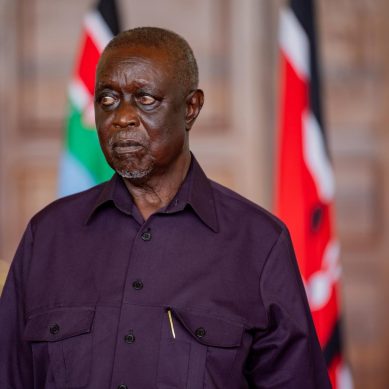
English football fans have been warned to lower their expectations of their national team: the Three Lions. If you are going to go down the “winner with a capital W” road, seeking what ousted England interim manager Lee Carsley – who took charge of the senior team after Gareth Southgate resigned in July – described over the weekend as a “world-class coach who has won trophies”, then the homegrown route isn’t really an option for England.
But we are back to the question of De la Fuente and Scaloni – and, yes, Southgate, Joachim Low, Roger Lemerre and so many others through the course of history – and whether international management requires not just a different skill set on the training pitch and the touchline but a different mindset in the weeks and months between international breaks.
If something has changed in the FA’s thinking, leading them to restore trophy-winning experience to the top of the job spec, it is perhaps because of how England’s Euro 2024 unfolded.
The more talented creative players Southgate had at his disposal, the harder he found it to strike the right tactical balance. As Carsley discovered against Greece last week, picking Jude Bellingham, Bukayo Saka, Cole Palmer, Antony Gordon and Phil Foden in the same line-up might not be the brainwave it had appeared after a 20-minute experiment on the training pitch.
Maybe the job requires a firmer hand now. Maybe the surplus of creative players requires the type of toughness and ruthlessness that the modern English coach – a more touchy-feely type, whether it is Southgate, Howe, Potter, Carsley, Gary O’Neil, Rob Edwards, Russell Martin or anyone else except perhaps Sean Dyche – is yet to develop fully.
If Southgate’s approach was considered perfect for the largely unheralded group of players he took to the 2018 World Cup, maybe the changing profile of the squad brings a demand for a different profile of coach, accustomed to working with top-level talents (and perhaps top-level egos) and turning them into a cohesive, balanced team.
One concern is that Thomas Tuchel’s Bayern team didn’t look much like that last season when they were beaten to the Bundesliga title for the first time in 12 campaigns. Neither did his Chelsea or PSG teams towards the end. At those three clubs, and indeed Dortmund and Mainz before that, he left in strained circumstances. There were tensions with the boardroom or dressing room or both. It was the biggest thing that deterred Manchester United from appointing him in place of Erik ten Hag last summer.
In other words, Tuchel is very different to the long-held FA ideal of a coach who keeps his head down and says the right thing. And it would be easier to get behind the idea of England being managed by a disruptor – The Rulebreaker, to borrow the delightful title of a biography by German journalists Tobias Schachter and Daniel Meuren – if they had not just enjoyed their best run of tournament campaigns in more than half a century under an unashamed conformist.
Beyond that, surely the England manager should be English. Not must, as some would have it, but should. England have enjoyed notable success under overseas coaches in other sports – and in women’s football — but it does not feel remotely controversial to suggest that the whole point of international sport should be to pit one nation’s talent against others.
There is already a backlash from some quarters against the prospect of a German taking charge of the England team, just as there was anger from the same quarters last month when Carsley did not sing along to the national anthem. At times, when it comes to the national team, the discourse goes far beyond reasonable principles of what international sport should be about and into the type of bombastic, jingoistic rhetoric that held English football back for so many years.
It is largely thanks to overseas influence that English football seems more enlightened these days. Even by the time of Capello’s appointment in 2007, the idea of the FA looking abroad for an England manager seemed far less alarming than it had seven years earlier.
But now, it feels like a regressive step in the message it sends to English coaches.
Carsley’s audition was far from perfect, undermined by his team selection against Greece and the confused messages in some of his media interviews, but he is barely less qualified for the England senior job than Southgate was in 2016. Potter would surely have been in with a shout had this job come up when he was at Brighton & Hove Albion in the summer of 2022, yet he seems to have been overlooked entirely based on a six-month tenure at Chelsea when they were at the height of their post-takeover dysfunction (something with which Tuchel would sympathise).
Howe has a desirable job at Newcastle United, but if the eligibility criteria for the England job include winning the game’s biggest prizes, could an English manager ever do that without putting himself far beyond the FA’s reach?
If it comes down to who has the best CV, it is hard to imagine how the best-qualified English coach could trump whichever leading manager happens to be looking for work after falling off the Champions League carousel, having parted ways with PSG, Chelsea, Bayern or whoever — or in Tuchel’s case, all three.
Even so, recent tournaments have strengthened the feeling that the international game is different: that hiring a “winner with a capital W” is not the shortcut to success that the FA previously imagined it was.
Should Tuchel succeed where his predecessor fell agonisingly short, then no England supporter, no matter how ingrained their John Bull tendencies, will find their celebratory fervour dampened by the nationality of the coach.
But Tuchel’s first challenge will be to measure up to the standard Southgate set over the previous eight years – and because this is international football, with its different rhythm and challenges, that is not the foregone conclusion it might otherwise seem.
- The Athletic report







